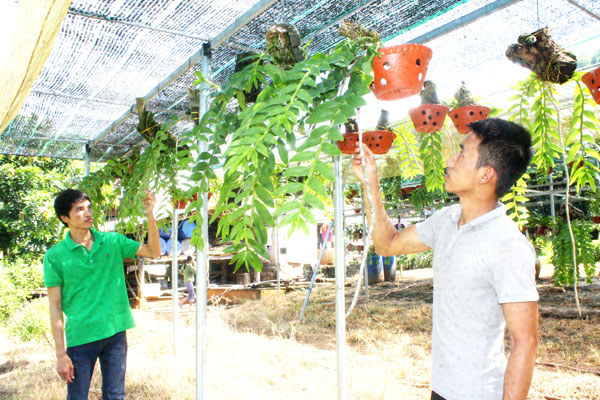
(HBO) - At the end of 2018, through the introduction of leaders of the People's Committee of Dong Lai commune, we visited an economic model in the commune which is already famous for red pomelo products.

The orchid garden owned by Nguyen Trung Hieu and Nguyen Xuan
Hoi in Bai Trang hamlet is one of the typical economic
models run by young people in Tan Lac district’s Dong Lai commune.
That is the model of growing red-flesh dragon fruit owned by Bui
Van Thanh, a member of the Ho Chi Minh Communist Youth Union (HCM CYU) of Doi
Bung hamlet. Last year, Thanh earned over 200 million VND from the model.
Realizing that the cultivation model of red-flesh dragon fruit brings high
economic value, many youths and farmers in the village have switched to
planting red-flesh dragon fruit in their fields and gardens.
Thanh’s model has opened up a new direction for economic
development in the locality.
Besides Thanh, in Dong Lai commune, there are many outstanding
youths who are shining examples of economic development.
Bui Van Hung, Secretary of the O Ga hamlet’s HCM CYU chapter has reaped success
with the model of combining the cultivation of grapefruit and goat breeding.
Meanwhile, Bui Van Truong in the hamlet earns nearly 1 billion VND per year
from growing red pomelo in combination with animal husbandry, and Bui Van Quynh
in Bai Trang village has a stable income from his citronella cultivation model.
The Dien grapefruit cultivation farm owned by Bui Van Ngoc, Vice Secretary of
the Dong Lai commune’s HCM CYU chapter is another example.
Most noteworthy is the orchid garden worth billions of VND of
Nguyen Trung Hieu and Nguyen Xuan Hoi in Bai Trang hamlet.
More than just an information technology teacher, Bui Van Nien is an inspiring figure who has nurtured the scientific curiosity and creative spirit of students in Vietnam’s ethnic minority communities.
Da Bac is the most disadvantaged mountainous district in Hoa Binh province, with ethnic minorities accounting for about 90% of its population. Over the past years, the district has mobilised resources to implement ethnic policies to improve the quality of life of local people.
In recent years, Hoa Binh province has consistently prioritised the protection, care, and education of children, particularly those from ethnic minorities and disadvantaged backgrounds, by creating a safe, healthy, and nurturing environment for their all-round development.
The Steering Committee for Tobacco Harm Prevention and Control of Hoa Binh province, in coordination with the Tobacco Harm Prevention and Control Fund, held a ceremony on May 28 in response to the World No Tobacco Day (May 31) and the National No Tobacco Week (from May 25 to 31). The event was chaired by Nguyen Van Toan, Standing Vice Chairman of the provincial People’s Committee and head of the Steering Committee.
Since 2021, the Center for Industrial Promotion and Industrial Development Consulting (CIIDC) under the Department of Industry and Trade has been implementing a school lighting model as part of the plan for using energy efficiently and economically in Hoa Binh Province in the pẻiod of 2021 - 2025. This model not only aims to improve the learning conditions and enhance the education quality, but it also promotes the message of energy saving, energy security, environmental protection and contributes to the goals of socio-economic development.
In the 2024 - 2025 school year, the entire Hoa Binh provincial education sector includes 520 educational institutions and schools. Among them are 13 ethnic boarding schools with 153 classes and 4,487 students. Four of these schools have met national standards, reaching 30.7 percent.



